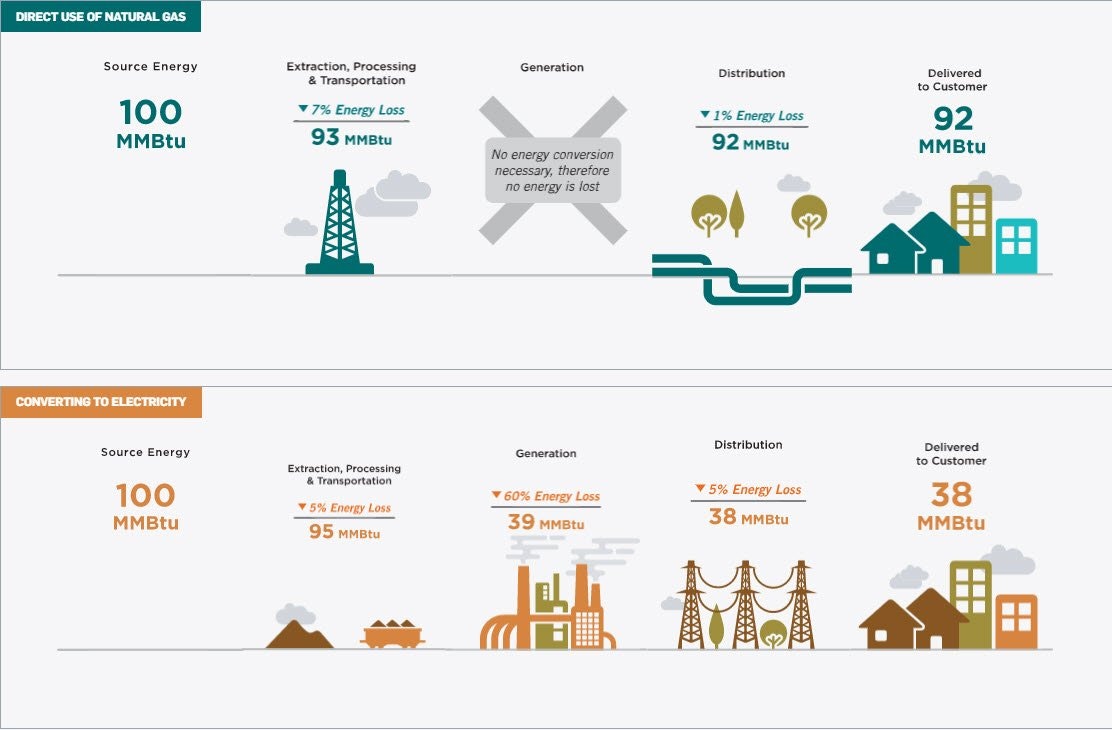Truth Efficient
Only 38% of your Electricity makes it to your home!
That’s why America’s Natural Gas delivery system is extraordinarily efficient with 92% of the natural gas produced at the wellhead being delivered to customers as usable energy.

From heating your home, cooking family meals, taking a hot shower, natural gas is clean, efficient, reliable, and less expensive than electricity.
Choose natural gas. It is the natural choice for your home and the environment.

- You can rely on Okaloosa Gas for reliable service during power outages and named storms. Keeping you comfortable and our community safe is our priority.
- Natural gas appliances will help you save money, improve the environment, and increase your comfort.
- Using natural gas throughout your home can reduce carbon emissions by over 40% while lowering energy costs.
- Natural gas has historically cost 10-50% less than electricity, heating oil, or propane.
Moreover, the energy efficiency of natural gas makes it more desirable for the planet. Did you know that natural gas is three times more efficient than using electricity to power appliances? With natural gas, about 92% of the energy is delivered directly to your home. Conversely, the electricity in your home is about 38% efficient because more than 62% of the source energy is lost in generating and delivering electricity from the power plant to your home.
Natural gas has always been environmentally friendly. When you consider efficiency, convenience, and environmental benefits, the natural choice for home appliances is natural gas. Not surprisingly, over 70% of home buyers prefer natural gas for cooking, heating, and water heating.
- Source: US Department of Energy/Energy Information Administration
More Truths about Natural Gas
- Natural gas is efficient. About 92 percent of the gas produced is delivered to customers as usable energy. Greater efficiency means fewer greenhouse gas emissions.
- Source: American Gas Association
- Gas use efficiency and appliance technology have improved tremendously over the past four decades, resulting in natural gas furnaces and boilers that can achieve 97 percent efficiency.
- Source: American Gas Association
- Slightly more than half of the homes in the United States use natural gas as their main heating fuel.
- Source: American Gas Association
- Natural gas is used to manufacture items such as paper, fertilizer, brick, photo film, even medicine.
- Source: American Gas Association
- The average American home consumes 40 percent less natural gas than it did 40 years ago.
- Source: American Gas Association
- By funding natural gas efficiency programs, natural gas utilities helped customers save 175 trillion Btu of energy and offset 9.1 million metric tons of carbon dioxide emissions in 2014.
- Source: American Gas Association
- Natural gas appliances provide energy efficiency benefits to help the environment. Households with natural gas vs. all-electric appliances produce 37 percent fewer greenhouse gas emissions.
- Source: American Gas Association
- Nearly 68 million American homes use natural gas, and 57 million are heated with natural gas. Natural gas utilities provide this efficient energy source that helps customers reduce their total energy consumption, particularly in residential and commercial (R&C) end-use applications.
- Source: American Gas Association
- The average American home consumes 40 percent less natural gas than it did 40 years ago. Since 1970, the decrease in natural gas use per residential and commercial customer has averaged one percentage point per year.
- Source: American Gas Association
- Efficient and reliable. Natural gas systems are more efficient than electric ones. Tankless gas water heaters have up to a 97% energy efficiency rating. Gas furnaces? They cost less to operate than heat pumps. So even when energy demands rise in your home, you’re still using less natural gas to get the job done reliably and safely.
- Source: Your Energy America
